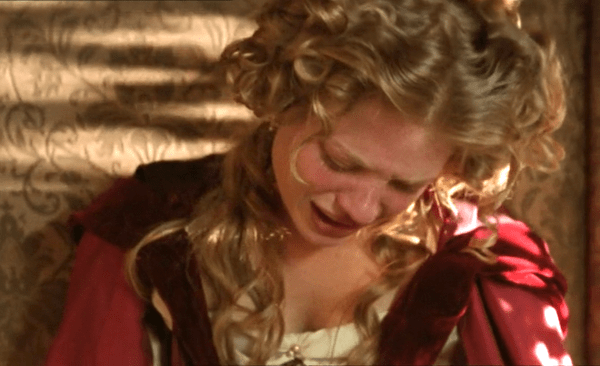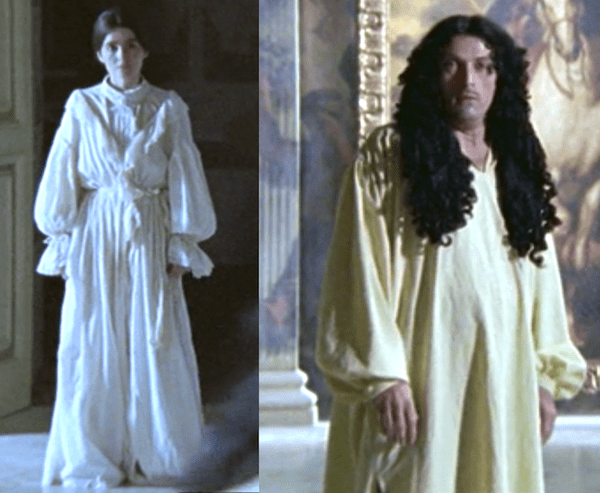
I loved The Last King (2003), also known as Charles II: The Power and The Passion, when I saw it way back when. It’s one I’ve always meant to rewatch, both because it was entertaining, but also because I know so much more about late 17th century costume now than I did back in the day. It’s got a great cast — Rufus Sewell as Charles II, Rupert Graves as the Duke of Buckingham, Helen McCrory as Barbara Villiers, Shirley Henderson as Catherine of Braganza — and who doesn’t love the story of the merry monarch and all his wimmin?
The costumes were designed by Mike O’Neill (Daniel Deronda, North and South, Elizabeth I with Helen Mirren). Sadly the series is old enough that there’s only a teeny bit of press to be found about it, and very little about the costumes. I’m guessing the budget was small, because there are some costumes that are great and others that leave a lot to be desired … and everything is filmed in close-up, which I always think is a way to avoid showing the costumes and/or the lack of extras!
I’ve been doing an occasional deep dive into the costumes of each episode, this final one inspired by Trystan giving me shit about how long it was taking me to write these. Check out my recap/reviews of episode one, two, and three.
This episode is VERY politics heavy, so most of it was boys and bad teeth and hard to get excited about visually, but I’ll do my best.
In 1678, Titus Oates accuses every Catholic under the sun of eating babies (shades of QAnon, much?) and plotting to kill the king. Charles is having none of it, but his political rivals — including longtime friend the Duke of Buckingham — decide to use it to their advantage.



Here’s what the real older Charles II looked like. Near the end of this episode, they give Rufus Sewell a double chin, but that’s the most they do in terms of aging.

Oates’s accusations include the queen, but Charles knows she’s loyal to him. I admit, I love the portrayal of their relationship in this miniseries, where you can tell they’re real friends despite all their marital woes (Charles’s mistresses, her inability to have children).
It made me happy that they’ve updated some of the hairstyles:


The core of all the plotting and politics is Charles’s insistence that his younger brother, the future James II, inherit the throne. James is Catholic, so most of the English are very much against this. Plotting frequently returns to Charles’s eldest (illegitimate) son, the Duke of Monmouth, who continues to be way too pretty.

The “Popish Plot” leads to all kinds of executions and popular unrest. As really happened, Nell Gwyn‘s carriage is accosted by angry masses under the mistaken apprehension that it’s French Catholic mistress Louise de Keroualle’s. Nell calms them by declaring, as she supposedly did, “Pray good people be civil, I am the Protestant whore.” I LOVE this green color!

The problem, however, is that none of the ladies’ dresses are moving with the times. Nell, along with the rest, is still very much in the fitted “robe” of the 1660s.

By the 1670s, the mantua is coming into fashion, and there should be at least some of them interspersed… but there isn’t, although there were in earlier episodes (see my recap of episode one for a fuller explanation).


We only see a glimpse of the back of Nell’s dress, but it looks suggestive of the back pleats seen on the mantua:


Louise de Keroualle is mistress #1 these days; she mostly cries, first because she’s racked up gambling debts and then because the English populace is calling her a whore.


Here’s what the real Louise looked like — dark hair and all:

Buckingham (Rupert Graves) continues to plot with the pro-Protestant parliament faction led by Lord Shaftesbury (Martin Freeman).

This pro-Protestant parliament faction is trying to force Charles to sign an act excluding his Catholic brother from the throne. Queen Catherine is supportive.


Here’s what Queen Catherine of Braganza was looking like these days:

Charles knows that Buckingham is plotting behind his back. Charles lets him know, and basically tells him goodbye.

Charles calls parliament. Everyone thinks he’s going to announce that he’s giving in on the succession.

There’s a great scene shot in close-up of Charles putting on his coronation robes.

Parliament walks in to find Charles decked out in full coronation gear. He tells them that the succession will stay as is, and he dissolved parliament, vowing from here on out to govern on his own. (Note: the monarch has — or at least had — the right to call and dissolve parliament; the main issue is that only parliament can approve new taxes etc., so this is Charles deciding to forgo that money [or just new money?] and, as we later find out, live on money given to him by Louis XIV who is pro-Catholic).

They are clearly referencing this famous portrait, although there are some slight differences (the knee floofies, for example):



There’s lots of dire predictions, but parliament has to accept things. Charles had sent Monmouth away to the Netherlands, but he shows back up to be pretty and get in trouble with his dad.

Life is winding down for Charles. Nell Gwyn goes to Louise de Keroualle, all casual like, and encourages her to be there for Charles.



Charles is tired. He’s fought parliament for the right of kings, but he knows that once he’s gone, his brother James will fuck it up (and he’s right). He has some funny, wry lines about how he’ll be dead, so he doesn’t care. There’s a final scene where a reflective Charles is out in the gardens with his mistresses, children, and various courtiers.

Nell Gwyn comforts Charles, making him laugh.



Queen Catherine advises Louise to stop crying and to be what Charles has always craved: a mother.




Louise cossets Charles, who is tired.

Charles has a final reckoning with his father’s portrait, then collapses, while Queen Catherine wears some kind of Victorian nightgown.

Charles dies (1685); there’s a nice little coda where the actor playing each key part tells us what happened to their character accompanied by a shot of them. We’re informed how James is deposed in favor of Protestant William and Mary; we see William, but no Mary.

And, we’re out!









The costumes aside, I have a hard time believing that that ornately carved and gilded coronation throne is period accurate. I’ve been around 17thc. British furniture and I don’t recall anything that OTT. It looks like a Disney fantasy chair for some production like Beauty and the Beast.
I think those garter floofies are a nod to the portrait, which has some kind of ruffles behind the real Charles’ knees, which might be part of his robe.
By all accounts Louise de Keroualle was on the whiney side. Charles seems to have had a weakness for high maintenance women.
I don’t know but I doubt the women had much to say to each other. Louise was under the delusion that Catherine liked her rather than merely tolerating her but she and Nell were always at daggers drawn.
Charles’loyal defense of his queen against the anti-Catholics makes up for a lot. At least Catherine thought so.
Charles made no secret that his sole goal was to remain king but he was probably doing his best to secure the succession of his brother who he regarded as his rightful heir even though he knew James would muck it up. How catholic Charles was is questionable. He may have been more pro France and royalist.
And Charles died a Catholic, something he probably realised he couldn’t have espoused and ruled England. Or maybe in 1660 hecould have, but im 99.9% sure he couldn’t have. And was the portrait of Catherine of Braganza you included was the only one showing a slightly P.O.C. descent or were they others? Considering how Charlotte of Mecklenburg Strelitz is her descendant. What happened to Barbara Cleveland in episode?
Sadly no Helen McCrory/Barbara Villiers in this episode, other than a quick “here’s what happened to her at the end of her life” at the very end.
I haven’t seen any other images of Catherine of Braganza that make her look anything other than white, but I noticed that on this image too!
Thanks for the prompt response. I’m going to have to re-watch this. But I keep on remembering the line in THE FIRST CHURCHILLS, Charles: ‘Jamie, you have the soul of a Medieval pope.’ James looks proud. Missing the point.
“And was the portrait of Catherine of Braganza you included was the only one showing a slightly P.O.C. descent or were they others? Considering how Charlotte of Mecklenburg Strelitz is her descendant.”
Okay, I’m not following this. How could Charlotte be Catherine’s “descendant” when Catherine had no living offspring?
Are they actually related to each other, beyond Charlotte having distant ancestry in Portugal?
They have a common ancestor. Charlotte of Mecklenburg Strelitz wasn’t a descendant – your right there.
Catherine of Braganza was olive skinned with very dark hair and eyes. So for that matter was Charles. That’s a common coloring of mediterranean europeans and far from unknown north of the Alps.
Hair curl, nose shape and lip shape also vary greatly among Europeans as well. Some Europeans have broad noses and broad, full lips.
And on top of it all, there’s the whole issue of how accurately a portrait actually captures features in the era before photography.
I think about that carriage scene with Nell Gwynn a lot. Especially now the people originally cursing Louise cheer for Nell.